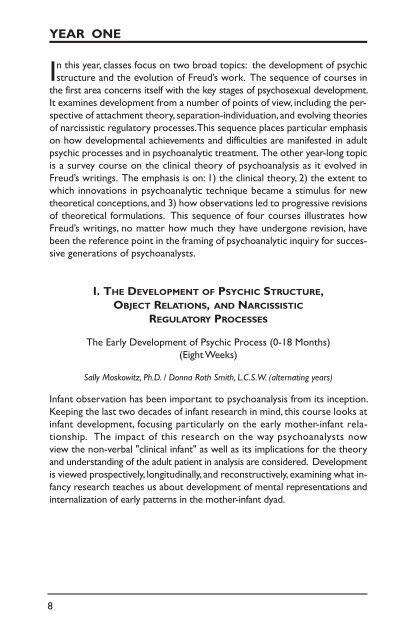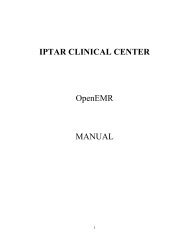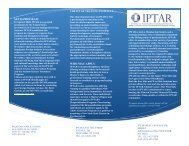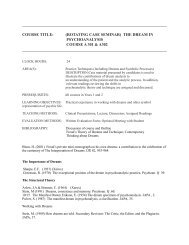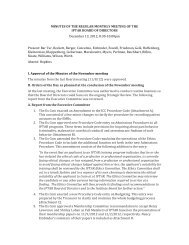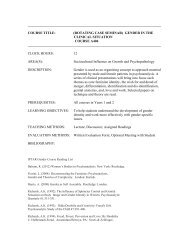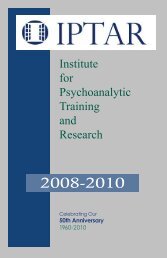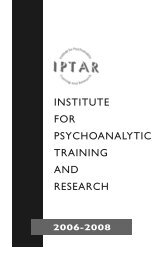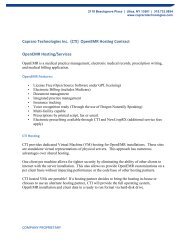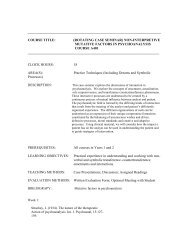IPTAR Bulletin - Institute for Psychoanalytic Training and Research
IPTAR Bulletin - Institute for Psychoanalytic Training and Research
IPTAR Bulletin - Institute for Psychoanalytic Training and Research
You also want an ePaper? Increase the reach of your titles
YUMPU automatically turns print PDFs into web optimized ePapers that Google loves.
YEAR ONE<br />
In this year, classes focus on two broad topics: the development of psychic<br />
structure <strong>and</strong> the evolution of Freud’s work. The sequence of courses in<br />
the first area concerns itself with the key stages of psychosexual development.<br />
It examines development from a number of points of view, including the perspective<br />
of attachment theory, separation-individuation, <strong>and</strong> evolving theories<br />
of narcissistic regulatory processes.This sequence places particular emphasis<br />
on how developmental achievements <strong>and</strong> difficulties are manifested in adult<br />
psychic processes <strong>and</strong> in psychoanalytic treatment. The other year-long topic<br />
is a survey course on the clinical theory of psychoanalysis as it evolved in<br />
Freud’s writings. The emphasis is on: 1) the clinical theory, 2) the extent to<br />
which innovations in psychoanalytic technique became a stimulus <strong>for</strong> new<br />
theoretical conceptions,<strong>and</strong> 3) how observations led to progressive revisions<br />
of theoretical <strong>for</strong>mulations. This sequence of four courses illustrates how<br />
Freud’s writings, no matter how much they have undergone revision, have<br />
been the reference point in the framing of psychoanalytic inquiry <strong>for</strong> successive<br />
generations of psychoanalysts.<br />
8<br />
I. THE DEVELOPMENT OF PSYCHIC STRUCTURE,<br />
OBJECT RELATIONS, AND NARCISSISTIC<br />
REGULATORY PROCESSES<br />
The Early Development of Psychic Process (0-18 Months)<br />
(Eight Weeks)<br />
Sally Moskowitz, Ph.D. / Donna Roth Smith, L.C.S.W. (alternating years)<br />
Infant observation has been important to psychoanalysis from its inception.<br />
Keeping the last two decades of infant research in mind, this course looks at<br />
infant development, focusing particularly on the early mother-infant relationship.<br />
The impact of this research on the way psychoanalysts now<br />
view the non-verbal "clinical infant" as well as its implications <strong>for</strong> the theory<br />
<strong>and</strong> underst<strong>and</strong>ing of the adult patient in analysis are considered. Development<br />
is viewed prospectively, longitudinally, <strong>and</strong> reconstructively, examining what infancy<br />
research teaches us about development of mental representations <strong>and</strong><br />
internalization of early patterns in the mother-infant dyad.<br />
The Phase of Further Differentiation <strong>and</strong> Early Exploration<br />
(Separation-Individuation)<br />
(Eight Weeks)<br />
Rena Greenblatt, Ph.D. / Rita Reiswig, M.S. (alternating years)<br />
This course explores the period of development that begins during the second<br />
half of the first year of life <strong>and</strong> ends in the third year. The course is organized<br />
around the subphases of the separation-individuation process—from differentiation<br />
<strong>and</strong> hatching to the achievement of a degree of self <strong>and</strong> object constancy.<br />
Perspectives on self-other differentiation from infant research, attachment<br />
theory, <strong>and</strong> the school of object relations will be included. Particular emphasis<br />
will be given to the emergence of symbolic functioning as manifested in gender<br />
identity, early language development, <strong>and</strong> play. C<strong>and</strong>idates will be encouraged<br />
to apply the developmental theory to their work with both children <strong>and</strong> adults.<br />
The Development of Triadic Relationships <strong>and</strong><br />
the Structuralization of the Superego<br />
(The Oedipal Phase)<br />
(Eight Weeks)<br />
Phyllis Hopkins, Ph.D. / Laura Kleinerman, M.S. (alternating years)<br />
Changes in social mores <strong>and</strong> our heightened interest in gender raise many<br />
questions concerning our traditional views of the oedipal phase <strong>and</strong> its unfolding<br />
during the course of the life cycle. This course traces Freud’s discovery of<br />
the Oedipus Complex <strong>and</strong> its far-reaching significance in psychoanalytic theory. The<br />
oedipal phase with its inherent conflicts will be studied from a number of different<br />
vantage points as well as from a developmental perspective including preoedipal<br />
<strong>and</strong> oedipal development. Freud’s theory of the Oedipus Complex has<br />
had enormous influence on our theories of sexuality <strong>and</strong> female sexuality in particular.<br />
The writings of Freud <strong>and</strong> his early followers will be compared <strong>and</strong> contrasted<br />
with contemporary research <strong>and</strong> theory on male <strong>and</strong> female gender<br />
development. Oedipal conflicts <strong>and</strong> their attempted resolutions will be examined<br />
in the context of superego development <strong>and</strong> identification. This course will also<br />
look at the Oedipus myth reinterpreted from a broader cultural perspective.<br />
9


